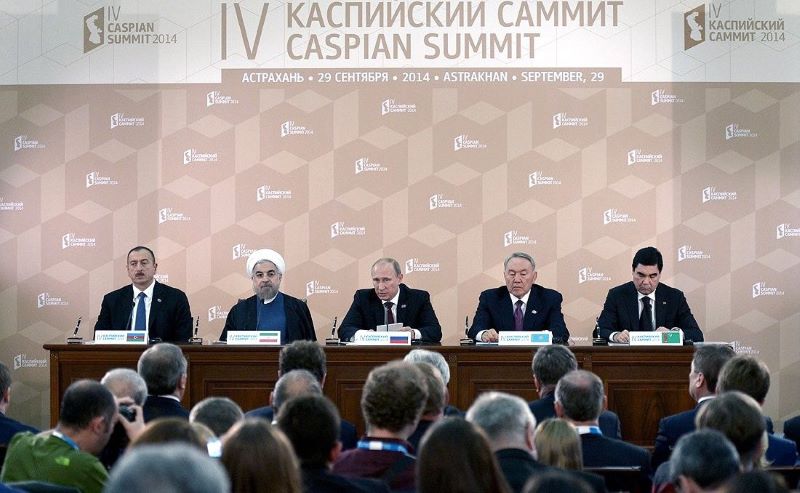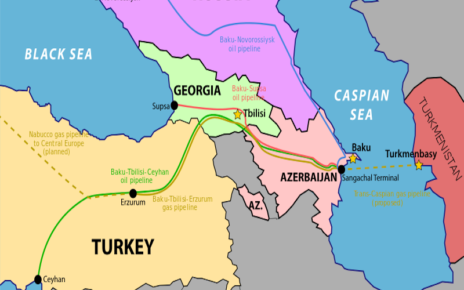The authoritative text of the Convention on the Status of the Caspian Sea (Caspian Convention), signed August 12 in Aktau, Kazakhstan, is now available.
After 23 years of negotiations, skepticism seems to be an influential trend in interpreting the Convention’s significance. It is easier for an expert to say, “Oh I didn’t expect such progress,” than to say, “I was wrong to say that it was so significant.” For example, Iran’s President Hassan Rouhani reference, in his oral remarks in Aktau, to further negotiations were made for domestic Iranian consumption. They do not mean that anything about the terms of the Convention remains to be completed.
Rather, the Caspian Convention sets out principles, and its Protocols (signed the same day) set out rules to implement those principles. The Protocols foresee more talks to nail down details of implementation. This was always the case. According to the Vienna Convention on the Law of Treaties, all Parties must honour the Caspian Convention even if they have not yet ratified it. Therefore, there is nothing “undecided” or tentative or lacking authority, about the terms of the Convention itself.
Such misunderstandings can also distort perspectives about the further exploitation of Caspian Sea energy resources. The Trans-Caspian Gas Pipeline (TCGP) is a case in point. Old obstacles, some illusory even in the past, are invoked to explain why this pipeline will never be built, or should never be built. To bring up those hypothetical obstacles is at best naive and at worst misleading.
For example, Azerbaijan and Turkmenistan never needed the Convention to have the right to lay the TCGP on the floor of the Caspian Sea. To start with, Article 8(1) the Caspian Convention affirms their right to delimit their contiguous sectors of the sea-bed, on a bilateral basis not requiring a five-way approval, according to “generally recognized principles” of international law. The best-known of these is the “modified median line” rule already applied trilaterally by Azerbaijan, Russia, and Kazakhstan, and bilaterally by Kazakhstan and Turkmenistan.
Azerbaijan and Turkmenistan could even implement the pipeline without delimiting their respective sectors. To do this, they would only have to agree to proceed on the project, without prejudice to whatever legal claims about delimitation that they might have. Indeed, Norway and the United Kingdom have been cooperating on this basis for decades in the North Sea. The Caspian Convention’s Article 14(3) affirms their right to lay pipelines on sea-bed across their contiguous sectors, without reference to third-party approval.
Critics will point to Article 14(2) of the Caspian Convention, which states that any pipeline projects will be subject to compliance with international environmental arrangements. However, this does not mean that either Russia or Iran could delay the TCGP. Such critics will either not understand or not clarify, that the reference here is to the Moscow Protocol on Environment Impact Assessment in Transboundary Context (signed on 20 July 2018) to the Tehran Convention (full name, Framework Convention for the Protection of the Marine Environment of the Caspian Sea, signed 2003, entered into force 2006).
The Moscow Protocol to the Tehran Convention provides (Article 10 and 1(a)) that the decision on implementation of any project shall be taken by the “Party(ies) under whose jurisdiction the proposed activity … is planned to be implemented.” That is to say, the decision is not subject to five-way approval. Therefore it is impossible for any littoral state to block any project with a simple veto, even in the theoretical case where there are multiple vetoes.
Further, Article 15 of the Moscow Protocol to the Tehran Convention states that “[a]ny dispute between the Contracting Parties concerning the application or interpretation of the provisions of this Protocol shall be settled in accordance with Article 30 of the [Tehran] Convention”, which in turn states that “the Contracting Parties will settle [disputes] by consultations, negotiations or by any other peaceful means of their own choice.”
There is no obligatory international court of any kind involved here, that some uninformed commentators have suggested. The choice of the means of peaceful settlement is up to the common consent of the Parties involved, and only those Parties who are involved, not all five. The text gives clear preference for regular consultations or negotiations of the regular diplomatic sort.
Consequently, there is no way to block or delay a prospective TCGP on environmental grounds, particularly in light of the best-practices-based authoritative study by the World Bank and the EU, which has already addressed every possible objection and consideration. In the case of the TCGP, there is not even a process to be abused by countries that might have an interest in halting gas pipeline development.
The final decision on implementation of a pipeline or any other project (there are dozens of types of industrial projects listed in an Annex) will be made, not by the five, but by the initiating country, which the Protocol calls the “Party of Origin”, this being Azerbaijan and/or Turkmenistan in the case ot the TCGP.
Photo: “Fourth Caspian Summit” (September 29, 2014) via kremlin.ru. Creative Commons.
Disclaimer: Any views or opinions expressed in articles are solely those of the authors and do not necessarily represent the views of the NATO Association of Canada.




